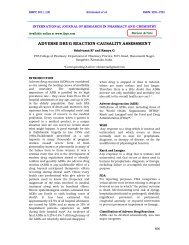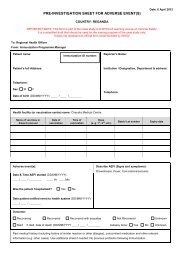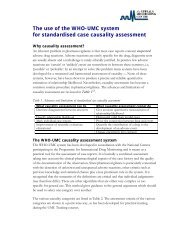00050
You also want an ePaper? Increase the reach of your titles
YUMPU automatically turns print PDFs into web optimized ePapers that Google loves.
IJRPC 2011, 1(3) Srinivasan et al. ISSN: 22312781<br />
Table 1: Characteristics of Type A and Type B Adverse Reactions<br />
Characteristics Type A Type B<br />
Dose dependency Usually shows good relationship No simple relation ship<br />
Predictable from<br />
known pharmacology<br />
Yes<br />
Not usually<br />
Host factors Genetic factors might be important<br />
Dependent on host<br />
factors<br />
Frequency Common Uncommon<br />
Severity<br />
Variable but usually mild<br />
Variable,<br />
proportionately more<br />
severe<br />
Clinical burden High morbidity and low mortality<br />
High morbidity and<br />
mortality<br />
Overall portion of<br />
adverse drug reaction<br />
80% 20%<br />
First detection<br />
Phase1-III<br />
Phase IV, occasionally<br />
phase III<br />
Animal models Usually reproducible in animals<br />
No known animal<br />
models<br />
Level 1<br />
Level 2<br />
Level 3<br />
Level 4<br />
Level 5<br />
Level 6<br />
Level 7<br />
Table 2: Hartwig’s Severity Assessment Scale<br />
An ADR occurred but required no change in treatment with the suspected drug.<br />
The ADR required that treatment with the suspected drug be held, discontinued, or otherwise<br />
changed. No antidote or other treatment requirement was required. No increase in length of stay<br />
(LOS)<br />
The ADR required that treatment with the suspected drug be held, discontinued, or otherwise<br />
changed.<br />
AND/OR<br />
An Antidote or other treatment was required. No increase in length of stay (LOS)<br />
Mild= level 1 and 2, moderate= level 3 and 4, severe= 5, 6 and 7.<br />
Any level 3 ADR which increases length of stay by at least 1 day . OR<br />
The ADR was the reason for the admission<br />
Any level 4 ADR which requires intensive medical care<br />
The adverse reaction caused permanent harm to the patient<br />
The adverse reaction either directly or indirectly led to the death of the patient<br />
1) Are there previous conclusive reports of this reaction?<br />
If YES = +1, NO = 0, Do not know or not done = 0<br />
2) Did the adverse event appear after the suspected drug was Given?<br />
If YES = +2, NO = -1, Do not know or not done = 0<br />
3) Did the adverse reaction improve when the drug was discontinued or a specific antagonist was given?<br />
If YES = +1, NO = 0, Do not know or not done = 0<br />
4) Did the adverse reaction appear when the drug was Re-administered?<br />
If YES = +2, NO = -2, Do not know or not done = 0<br />
5) Are there alternative causes that could have caused the reaction?<br />
If YES = -1, NO = +2, Do not know or not done = 0<br />
6) Did the reaction reappear when a placebo was given?<br />
If YES = -1, NO = +1, Do not know or not done = 0<br />
7) Was the drug detected in any body fluid in toxic Concentrations?<br />
If YES = +1, NO = 0, Do not know or not done = 0<br />
610






